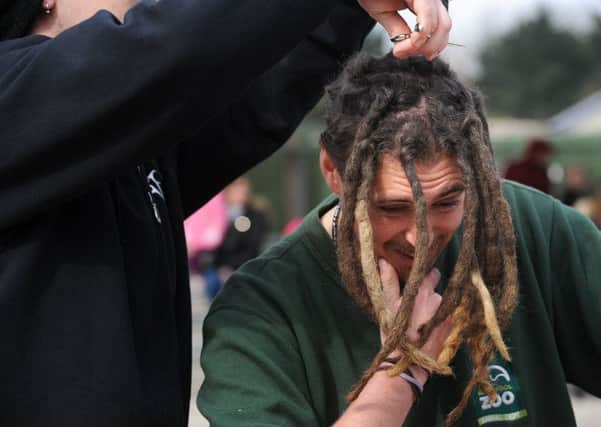Blackpool Zoo worker had his dreadlocks shaved off in front of 80 guests to raise cash to help this threatened species


Dom Ricchiuti, 30, was left with a bald head following a public shave at the attraction on Saturday – but said it’s all for a good cause.
All the money raised will go towards Silent Forest’s Treasure Island: Saving the hidden avian treasures project, which aims to protect one of the last bird paradises in Indonesia.
Advertisement
Hide AdAdvertisement
Hide Ad“There is currently a crisis threatening the survival of some of Asia’s most important, beautiful, and key songbird species,” Dom said.


“As a devoted member of the conservation industry, I am doing my part by offering to lose my dreads to help prevent the dread of silent forests, bringing awareness to this ongoing crisis and help improve the situation of Asian songbirds in their natural habitat.”
Dom, who had his dreadlocks for around four years, wants to raise £1,000 towards the project’s €35,000 goal, which will increase the presence of rangers on the island, the exact location of which is not being revealed; tackle bird poaching and protect sea turtles; and monitor the white-humped shama and nias hill myna populations.
More than £300 has so far been raised on online fundraising site GoFundMe, while £200 more was collected at the zoo.
Advertisement
Hide AdAdvertisement
Hide AdAround 80 people packed into the bird arena to watch the hair go, and gave a round of applause as the last dreadlock fell from Dom’s head.
The zoo, in East Park Drive, is currently building four aviaries: two Silent Forest birdhouses, which will home the endangered birds; Rainbow Landings, which will allow guests to feed up to 50 rainbow lorikeets; and World of Wings, which will feature birds from across the globe. Donate to Dom at www.tinyurl.com/y24vav4v
HELPING THE TREASURE ISLAND
The ‘treasure island’ is uninhabited with a large forest and is extremely hard to get to, making it one of the last bird paradises in the southeast Asian country of Indonesia, Silent Forest said.
Its exact location has not been revealed, but it is said to be a haven for many birds targeted by poachers, including the white-rumped shama – the most traded species for songbird singing competitions.
The island is also home to the last remaining nias hill myna birds – which are critically endangered.
Currently, rangers only protect songbirds while they monitor sea turtle nesting sites.